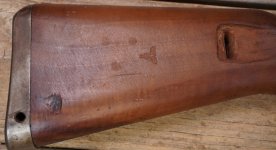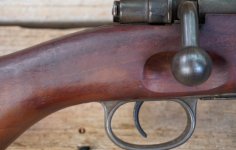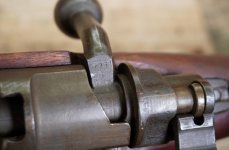Tiger 2 Tank
Senior Member
Hello,
I am looking at a nice late 35XX T block K.98k. Rifle matches itself, except the entire bolt assembly which matches itself in the T Block as well. The bolt assembly is not too far off in serial number to the rest of the rifle (40XX T). The cocking piece is a blued S/42 (matching to the bolt assembly) part. Everything looks correct. Stock is dark walnut and the wood hand guard is lighter laminated. Majority of the rifle finish is phosphate. Bolt assembly is mostly phosphate as well. Stock has e/H stamp. Receiver has the final proof stamp.
If it has the final receiver proof and side stock proof, I would think that it would have been ALL correct and not mismatched coming from the factory? Probably answered my own question. Wanted the expert's opinion.
I know it is a mismatch, but is it a GI assembled, factory capture mismatch? No photos to show, sorry.
I am looking at a nice late 35XX T block K.98k. Rifle matches itself, except the entire bolt assembly which matches itself in the T Block as well. The bolt assembly is not too far off in serial number to the rest of the rifle (40XX T). The cocking piece is a blued S/42 (matching to the bolt assembly) part. Everything looks correct. Stock is dark walnut and the wood hand guard is lighter laminated. Majority of the rifle finish is phosphate. Bolt assembly is mostly phosphate as well. Stock has e/H stamp. Receiver has the final proof stamp.
If it has the final receiver proof and side stock proof, I would think that it would have been ALL correct and not mismatched coming from the factory? Probably answered my own question. Wanted the expert's opinion.
I know it is a mismatch, but is it a GI assembled, factory capture mismatch? No photos to show, sorry.
Last edited:


















